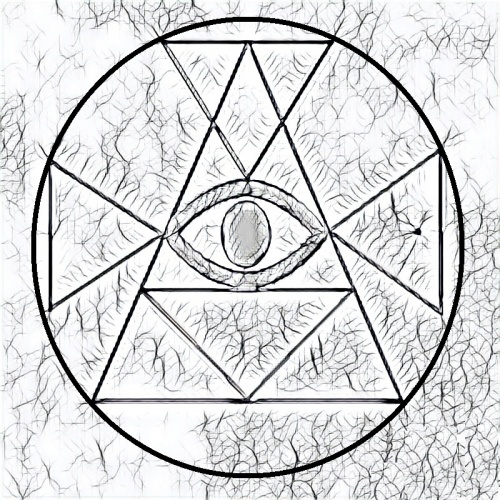Egyptian demons: Difference between revisions
| Line 3: | Line 3: | ||
== <span style="color:#800000;"> '''Demons & Messengers''' == | == <span style="color:#800000;"> '''Demons & Messengers''' == | ||
The Egyptians believed in several classes of spirits. The ghosts of the blessed dead were called ''ahku'' (singular ''ahk''). Spells sometimes appealed to them for help. ''Mut'' were evil or at least unredeemed ghosts. Gods could project spirit-images, called ''bau'' (singular ''ba''), to serve as messengers and convey blessings or curses. Duat (the Egyptian Underworld) held a variety of demons and monsters. Apep, the Great Serpent of Chaos, became the most notorious. | The Egyptians believed in several classes of spirits. The ghosts of the blessed dead were called ''ahku'' (singular ''ahk''). Spells sometimes appealed to them for help. ''Mut'' were evil or at least unredeemed ghosts. Gods could project spirit-images, called ''bau'' (singular ''ba''), to serve as messengers and convey blessings or curses. Duat (the Egyptian Underworld) held a variety of demons and monsters. Apep, the Great Serpent of Chaos, became the most notorious. Egyptian funerary texts describe other monsters too, though, such as Maka, a flint-armored and knife-slashing serpent 50 feet long. The lesser demons, called ''sebau'', serve Set. Their chief, Seba, looks like a giant snake with 12 human heads sprouting from its body. ''Sebau'' looks like serpents, crocodiles, or patchworks of these creatures with human parts. | ||
The blessed souls lie beyond the reach of Ahku, but lector-priests can evoke ''mut'', ''bau'', and ''sebau''. Setite sorcerers greatly prefer the ''sebau''. Some Setites believe that clanmates who suffer Final Death become ''sebau'', transformed by the power of Set. | |||
Storytellers can refer to the '''Vampire: The Masquerade''' (pg.282-283) for "quick and dirty" Wraith templates. | |||
== '''[[Apophis]]''' <span style="color:#DC143C;"> ''The Lord of Chaos'' == | == '''[[Apophis]]''' <span style="color:#DC143C;"> ''The Lord of Chaos'' == | ||
Revision as of 20:52, 29 April 2019
Names Inked in Crimson: The Demons of Egypt
Demons & Messengers
The Egyptians believed in several classes of spirits. The ghosts of the blessed dead were called ahku (singular ahk). Spells sometimes appealed to them for help. Mut were evil or at least unredeemed ghosts. Gods could project spirit-images, called bau (singular ba), to serve as messengers and convey blessings or curses. Duat (the Egyptian Underworld) held a variety of demons and monsters. Apep, the Great Serpent of Chaos, became the most notorious. Egyptian funerary texts describe other monsters too, though, such as Maka, a flint-armored and knife-slashing serpent 50 feet long. The lesser demons, called sebau, serve Set. Their chief, Seba, looks like a giant snake with 12 human heads sprouting from its body. Sebau looks like serpents, crocodiles, or patchworks of these creatures with human parts.
The blessed souls lie beyond the reach of Ahku, but lector-priests can evoke mut, bau, and sebau. Setite sorcerers greatly prefer the sebau. Some Setites believe that clanmates who suffer Final Death become sebau, transformed by the power of Set.
Storytellers can refer to the Vampire: The Masquerade (pg.282-283) for "quick and dirty" Wraith templates.
Apophis The Lord of Chaos
The Ibdai Urbina
The Ibdai Urbina are broken into three factions: the Youngers, The Fully Fledged, and the Elders.
- [[Amun-Ameneith] The Dog of Lust (A Younger)
- Utu Kynthia
- Monifa Pallas
- Raabi'a Pryderi
- Iskandar Naaji The Emerald Serpent of Asphixiation (Fully Fledged)
- Dawad Malak
- Fazl Allerna
- Yusra Khalilah
- Kidist Deianira The Elder Sow (Elder)
- Adnan Samiya
- Oenone Phaedra
- Atifa Wasim
